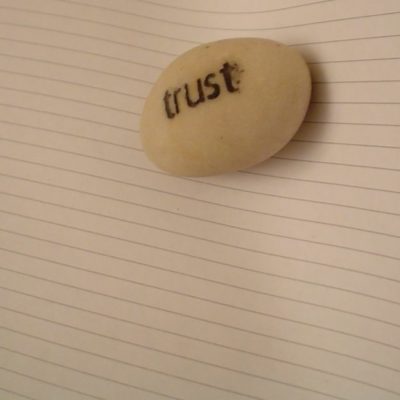
personal Trust
Trust can be talked about in many ways and has been a frequent focus point for relationship distress. However, trust has rarely been discussed as a reason for a lack of confidence, general insecurities, or symptoms of anxiety and depression. To narrow the definition and clarify more about what trust means, we need to first start with the question of what areas do you trust or distrust? Do you trust your partner, trust in other people’s actions or intentions, trust in your resiliency, trust in your performance, trust in your follow through, trust in you doing the right thing, etc. What situations do you enter that you naturally and automatically trust yourself and the opposite question, what situations do you enter that you doubt yourself and feel incapable of behaving in accordance to your values or standards. Trust will be broken up into two separate posts: personal trust and relational trust. This post will focus on the first aspect, personal trust, and how to take steps to begin trusting yourself.
Research indicates that trust revolves around two main aspects: morality and reliability. Morality involves your ethics and moral standards. Your value system (what is good, bad, right, wrong) provides a lens to judge behaviors (yours and others). Reliability involves discipline, consistency, and dependability. If something or someone was unreliable, it would be a mistake to trust since this person would only be reliably inconsistent.
Before moving towards our own morality and reliability, it can be helpful to first understand which camp you typically fall into-do you tend to trust yourself too much (give yourself undue credit and expect perfection) or not enough (doubt yourself even when there is evidence of your capability). The term confirmation bias is used in psychological and sociological literature to essentially describe the process of paying attention to and giving a lot of importance to things that we already value and downplaying evidence to the contrary. For example, let’s say you believe you are not good at your job and frequently doubt your work performance. You have been promoted to a higher-paying job, receive frequent compliments from coworkers, and have been working at this company for years. The confirmation bias within you may only pay attention to the few times that you needed to adjust a work project or when your boss criticized one of your presentations. However, if you were to look at the overall evidence, it would point towards you not only performing sufficiently but there is more evidence of overall success rather than failure. When it comes to trust, explore which confirmation bias you typically have: Do you tend to trust yourself even when you shouldn’t (i.e., expecting reliability out of yourself when evidence shows a lack of reliability) or distrust yourself (expecting faults/mistakes when evidence shows reliability). We need to first identify which camp you tend to fall into because in either case, you will lose–either by setting yourself up for failure or not engaging in something you are capable of.
Next, explore your own value system. It is necessary to have knowledge and confidence in your ethics and morality to regain your self-trust. Research indicates that treating yourself and others with moral standards of integrity, honesty, kindness, love, and goodwill grow reliability and dependability (i.e., trust). However, we are a work in progress so you may simply want to go through these moral standards and see where you fall in those categories. Remember, this is about trusting our own intentions, motives, and actions. If our actions are connected to our core beliefs then we will begin to trust ourselves and build confidence. If we don’t act in accordance to our values, we will get guilt, shame, and grow insecurities. Explore and understand your core values and in turn the rewards/consequences of acting in opposition of these values. For example, if you value treating people with kindness, you will have guilt when treating people maliciously. Many people’s problems involve a clashing of values. For example, a 27 yr old man had a value of kindness but he also valued strength. For him, when he had a sense of being “too kind” he got walked over on (and in turn, felt resentful) and when he was feeling “too strong” he had a sense of feeling domineering (in turn, guilty). This man was able to explore and discover that he wanted to be BOTH understanding (kind) and assertive (strong). Check to ensure that your actions line up with your discovered moral standards. If you notice any discrepancies, start small and gradually build towards this standard. Another example is of a middle-aged woman who had a sense that she acted dishonestly in a recent conversations (e.g., she agreed with someone to appease them but did not genuinely agree with them and felt disingenuous about this). She needed to begin small and intentionally voice her genuine thoughts and opinions on topics even if it was met with judgment or criticism. Remember, even if this is in subtle or small ways, the process of acting in accordance to your values is the important aspect to repair your trust in yourself.
Now that we have started discovering our values, we need to be disciplined and consistent in our actions. Reliability and consistency are cornerstones of trust. If we are not reliable to do what we need for ourselves, we won’t be able to count on ourselves. The key to reliability is follow through or keeping promises (doing what you say you will do). This is the opposite of lying and deceit. It is the discipline and willpower to stick to your values even when you don’t feel like it or when it is uncomfortable. It will show yourself and others that your words and actions are lined up. It is very easy to trust someone who does what they say will do so begin small and gradually build this reliance on yourself. A 22 yr old woman recently began to trust herself more by finishing knitting a blanket that she had started last year and promised to give someone. This “small” act of finishing the blanket proved to her that she would not let things go unfinished and she would follow through with doing what she said she would do. Again, start small and gradually build your dependability and consistency
Lastly, ensure your trust in yourself is being determined by yourself and only yourself. We often trust others to give us feedback about certain people (ex. since John said that Nick is trustworthy and we trust John then we will be more likely to trust Nick). We can do this with ourselves– if we perceive others who we trust as not trusting us then we may be prone to not trusting ourselves (ex. we trust John, John doesn’t show trust in us, therefore we begin distrusting ourselves). The trust in yourself would be aligned with your trust in John. This will leave you tethered to John rather than putting your focus on aligning your actions with your values and gaining trust and self-confidence.
